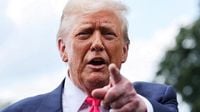President Donald Trump signaled on Tuesday, July 22, 2025, that a visit to China could be "not too distant," raising hopes for a potential summit between the leaders of the world’s two largest economies. Speaking during a meeting with Philippine President Ferdinand Marcos Jr. at the White House, Trump indicated that discussions are underway for a high-profile encounter with Chinese President Xi Jinping, possibly later this year.
Trump’s remarks come amid a noticeable easing of trade tensions that have defined U.S.-China relations in recent years. Since his return to office, Trump has maintained a tough stance on China, imposing steep tariffs that sparked a retaliatory trade war. China responded by hiking tariffs on American goods to 125%, while the U.S. raised tariffs on Chinese imports to 145%. Both nations also restricted critical products — China on rare earth minerals and the U.S. on computing chips and jet engine technology — creating significant disruptions in global supply chains.
However, recent diplomatic efforts have begun to soften this hardline posture. Two rounds of high-level talks in Geneva and London led to agreements to reduce tariffs, pending a more permanent deal expected by mid-August 2025. Treasury Secretary Scott Bessent announced plans to meet with Chinese officials in Stockholm the week of July 28 to discuss a probable extension of the August 12 deadline for finalizing the trade accord.
During the White House meeting, Trump praised the "fantastic military relationship" between the U.S. and the Philippines, underscoring the strategic importance of Manila as the U.S. counters China’s growing influence in the Indo-Pacific region. Trump claimed that the Philippines, which had been perceived as leaning toward China, was swiftly "un-tilted" under his administration’s guidance.
Trump also highlighted positive developments in trade, noting that Beijing has resumed shipping "record numbers" of rare earth magnets to the U.S. These magnets are essential components in a range of high-tech products, including iPhones, electric vehicles, wind turbines, and robots. This move signals a thaw in the restrictions that had previously hindered American manufacturers.
Experts suggest that a summit between Trump and Xi could provide a crucial reset for the fraught bilateral relationship, which has been marked by mistrust and fierce competition. Danny Russel, a distinguished fellow at the Asia Society Policy Institute, pointed out that Trump’s consistent desire for a visit to China has been a key factor in Beijing’s willingness to negotiate. "As soon as the leadership in Beijing is satisfied that Trump will be on his best behaviour and will accept terms for a deal that they think are favorable, they will give a green light to the visit," Russel explained.
Sun Yun, director of the China program at the Washington-based Stimson Center, echoed this view, saying a visit "is in the making" and likely to coincide with a trade deal. While some speculation had suggested a September trip, Sun believes the visit might happen in November, contingent on progress in trade and other negotiations. Potential occasions include the Asia-Pacific Economic Cooperation (APEC) summit in South Korea or talks on the sidelines of the October 30-November 1 event. Another possibility is a September 3 ceremony in Beijing marking the 80th anniversary of the end of World War II, which Russian President Vladimir Putin is also expected to attend.
Trump’s comments about the potential China trip were made against the backdrop of a complex geopolitical landscape. The U.S. and the Philippines maintain a seven-decade-old collective defense treaty, which could draw America into any conflict arising from maritime disputes between Manila and Beijing over the South China Sea. Trump’s administration has been keen to reinforce this alliance as a counterbalance to China’s assertiveness in the region.
On the trade front, Trump has pushed for sweeping tariff reforms, including a universal base tariff rate of 10% on all imports, with higher rates for certain countries. Currently, imports from China carry the highest tariff rate at 55%. Despite his tough stance, Trump has recently sought to lower tensions, describing his personal rapport with Xi as "healthy." The prospect of a summit could signal a significant thaw in relations, at least temporarily.
Meanwhile, Beijing took a conciliatory step by suspending an antitrust investigation into the operations of chemical giant DuPont in China. The probe, launched in April 2025 as part of China’s retaliatory response to U.S. tariffs, was halted without explanation. DuPont expressed satisfaction with the decision, calling it a positive development.
China has also agreed to approve export permits for rare earth elements and magnets critical to U.S. manufacturers, while the U.S. has eased restrictions on some advanced chips and technologies. These moves indicate a mutual willingness to ease trade barriers and stabilize supply chains.
Despite these promising signs, challenges remain. Treasury Secretary Bessent plans to raise concerns about China’s purchases of Russian and Iranian oil and its role in supporting Moscow’s war in Ukraine during his upcoming talks. These issues underscore the broader geopolitical tensions that complicate U.S.-China relations beyond trade.
As the August 12 deadline approaches, all eyes will be on the negotiations and whether a durable trade agreement can be reached. Should the summit between Trump and Xi materialize, it would mark their first face-to-face meeting since Trump’s inauguration for his second term in January 2025, potentially setting the stage for a new chapter in one of the world’s most critical bilateral relationships.




